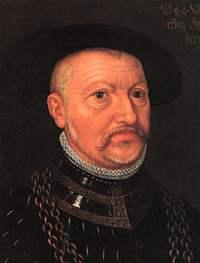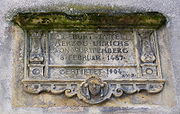
Ulrich, Duke of Württemberg
Encyclopedia

Riquewihr
Riquewihr is a commune in the Haut-Rhin department in Alsace in north-eastern France.A popular tourist attraction for its historical architecture, Riquewihr is also known for the Riesling and other great wines produced in the village...
, Alsace
Alsace
Alsace is the fifth-smallest of the 27 regions of France in land area , and the smallest in metropolitan France. It is also the seventh-most densely populated region in France and third most densely populated region in metropolitan France, with ca. 220 inhabitants per km²...
– November 6, 1550) succeeded his kinsman Eberhard II
Eberhard II, Duke of Württemberg
Eberhard VI/II was count of Württemberg-Stuttgart since 1480 as Eberhard VI and Duke Eberhard II of Württemberg since 1496....
as Duke of Württemberg
Württemberg
Württemberg , formerly known as Wirtemberg or Wurtemberg, is an area and a former state in southwestern Germany, including parts of the regions Swabia and Franconia....
in 1498, being declared of age in 1503.
Early life
He served the German king, Maximilian IMaximilian I, Holy Roman Emperor
Maximilian I , the son of Frederick III, Holy Roman Emperor and Eleanor of Portugal, was King of the Romans from 1486 and Holy Roman Emperor from 1493 until his death, though he was never in fact crowned by the Pope, the journey to Rome always being too risky...
, in the war over the succession to the duchy of Bavaria-Landshut in 1504, receiving some additions to Württemberg as a reward; he accompanied Maximilian on his unfinished journey to Rome
Rome
Rome is the capital of Italy and the country's largest and most populated city and comune, with over 2.7 million residents in . The city is located in the central-western portion of the Italian Peninsula, on the Tiber River within the Lazio region of Italy.Rome's history spans two and a half...
in 1508; and he marched with the imperial army into France in 1513. Meanwhile in Württemberg Ulrich had become very unpopular. His extravagance had led to a large accumulation of debt, and his subjects were irritated by his oppressive methods of raising money. In 1514 an uprising under the name of Poor Conrad
Poor Conrad
The Poor Conrad was the name of a Peasant Rebellion in 1514 against Ulrich, Duke of Württemberg. The rebels called themselves Poor Conrads because this was the term used by the nobility to mock them, meaning poor fellows or poor devils...
broke out, and was only suppressed after Ulrich had made important concessions to the estates in return for financial aid. The duke's relations with the Swabian League
Swabian League
The Swabian League was an association of Imperial States - cities, prelates, principalities and knights - principally in the territory of the Early medieval stem duchy of Swabia, established in 1488 at the behest of Emperor Frederick III of Habsburg and supported as well by Bertold von...
, moreover, were very bad, and trouble soon came from another quarter also.

Sabina of Bavaria
Sabina of Bavaria-Munich was born Duchess of Bavaria and became wife of Ulrich, Duke of Württemberg.-Family:...
, a daughter of Albert IV, Duke of Bavaria
Albert IV, Duke of Bavaria
Duke Albert IV of Bavaria-Munich , , from 1467 Duke of Bavaria-Munich, from 1503 Duke of the reunited Bavaria.-Biography:...
, and niece of the emperor Maximilian. The marriage was a very unhappy one, and having formed an affection for the wife of a knight named Hans von Hutten, a kinsman of Ulrich von Hutten
Ulrich von Hutten
Ulrich von Hutten was a German scholar, poet and reformer. He was an outspoken critic of the Roman Catholic Church and a bridge between the humanists and the Lutheran Reformation...
, the duke killed Hans in 1515 during an altercation. Hutten's friends now joined the other elements of discontent. Fleeing from her husband, Sabina won the support of the emperor and of her brother William IV, Duke of Bavaria
William IV, Duke of Bavaria
William IV of Bavaria was Duke of Bavaria from 1508 to 1550, until 1545 together with his younger brother Louis X, Duke of Bavaria....
, and Ulrich was twice placed under the imperial ban. After the death of Maximilian in January 1519 the Swabian League
Swabian League
The Swabian League was an association of Imperial States - cities, prelates, principalities and knights - principally in the territory of the Early medieval stem duchy of Swabia, established in 1488 at the behest of Emperor Frederick III of Habsburg and supported as well by Bertold von...
interfered in the struggle, and Ulrich was driven from Württemberg, which was afterwards sold by the league to the emperor Charles V.
In exile
Ulrich passed some time in SwitzerlandSwitzerland
Switzerland name of one of the Swiss cantons. ; ; ; or ), in its full name the Swiss Confederation , is a federal republic consisting of 26 cantons, with Bern as the seat of the federal authorities. The country is situated in Western Europe,Or Central Europe depending on the definition....
, France
France
The French Republic , The French Republic , The French Republic , (commonly known as France , is a unitary semi-presidential republic in Western Europe with several overseas territories and islands located on other continents and in the Indian, Pacific, and Atlantic oceans. Metropolitan France...
and Germany
Germany
Germany , officially the Federal Republic of Germany , is a federal parliamentary republic in Europe. The country consists of 16 states while the capital and largest city is Berlin. Germany covers an area of 357,021 km2 and has a largely temperate seasonal climate...
, occupied with brigand exploits and in service under Francis I of France
Francis I of France
Francis I was King of France from 1515 until his death. During his reign, huge cultural changes took place in France and he has been called France's original Renaissance monarch...
; but he never lost sight of the possibility of recovering Württemberg and about 1523 he announced his conversion to the reformed faith. His opportunity came with the outbreak of the German Peasants' War
German Peasants' War
The German Peasants' War or Great Peasants' Revolt was a widespread popular revolt in the German-speaking areas of Central Europe, 1524–1526. At its height in the spring and summer of 1525, the conflict involved an estimated 300,000 peasants: contemporary estimates put the dead at 100,000...
. Posing as the friend of the lower orders and signing himself "Ulrich the peasant", his former oppressions were forgotten and his return was anticipated with joy. Collecting men and money, mainly in France and Switzerland, he invaded Württemberg in February 1525, but the Swiss in his service were recalled owing to the defeat of Francis I of France at Pavia
Pavia
Pavia , the ancient Ticinum, is a town and comune of south-western Lombardy, northern Italy, 35 km south of Milan on the lower Ticino river near its confluence with the Po. It is the capital of the province of Pavia. It has a population of c. 71,000...
; the peasantry were unable to give him any serious support, and in a few weeks he was again a fugitive.
During his exile Ulrich had formed a friendship with Philip, landgrave of Hesse; and his restoration, undertaken by Philip, is an event of some importance in the political history of the Reformation. In 1526 Philip had declared he was anxious to restore the exiled duke, and about the same time Francis I and Zwingli
Huldrych Zwingli
Ulrich Zwingli was a leader of the Reformation in Switzerland. Born during a time of emerging Swiss patriotism and increasing criticism of the Swiss mercenary system, he attended the University of Vienna and the University of Basel, a scholarly centre of humanism...
had intimated their willingness to assist in a general attack upon the Habsburgs. Many difficulties, however, barred the way, and it was 1534 before Philip was prepared to strike.
Restoration
In January of that year Francis I had definitely promised assistance; the Swabian league had just been dissolved; and, after a manifesto had been issued by Ulrich and Philip justifying the proposed undertaking, Württemberg was invaded in April 1534. Charles V and his brother, the German king, Ferdinand IFerdinand I, Holy Roman Emperor
Ferdinand I was Holy Roman Emperor from 1558 and king of Bohemia and Hungary from 1526 until his death. Before his accession, he ruled the Austrian hereditary lands of the Habsburgs in the name of his elder brother, Charles V, Holy Roman Emperor.The key events during his reign were the contest...
, could send but little assistance to their lieutenants, and on the 13 May the troops of the Habsburgs were completely defeated at Lauffen. In a few weeks Ulrich was restored, and in June 1534 a treaty was negotiated at Kaaden by which he was recognized as duke by Ferdinand, but was to hold Württemberg under Austrian suzerainty. After some hesitation Ulrich yielded to the solicitations of Philip, and signed the treaty in February 1535.

Martin Luther
Martin Luther was a German priest, professor of theology and iconic figure of the Protestant Reformation. He strongly disputed the claim that freedom from God's punishment for sin could be purchased with money. He confronted indulgence salesman Johann Tetzel with his Ninety-Five Theses in 1517...
and Zwingli. Many convents and monasteries were destroyed, and extensive seizures of church property formed a welcome addition to his impoverished exchequer (this act was precisely simulatenous with the similar Dissolution of the Monasteries
Dissolution of the Monasteries
The Dissolution of the Monasteries, sometimes referred to as the Suppression of the Monasteries, was the set of administrative and legal processes between 1536 and 1541 by which Henry VIII disbanded monasteries, priories, convents and friaries in England, Wales and Ireland; appropriated their...
undertaken by King Henry VIII
Henry VIII of England
Henry VIII was King of England from 21 April 1509 until his death. He was Lord, and later King, of Ireland, as well as continuing the nominal claim by the English monarchs to the Kingdom of France...
of England). Taxation, however, was so heavy that he soon lost his temporary popularity. In April 1536 he joined the league of Schmalkalden, though he did not assent to some of the schemes of Philip of Hesse for attacking Charles V. In 1546 his troops fought against the emperor during the war of the league of Schmalkalden, but with disastrous results for Württemberg. The duchy was quickly overrun, and the duke compelled to agree to the treaty of Heilbronn in January 1547. By this treaty Charles, ignoring the desire of Ferdinand to depose Ulrich again, allowed him to retain his duchy, but stipulated that he should pay a large sum of money, surrender certain fortresses, and appear as a suppliant before the emperor at Ulm. Having submitted under compulsion to the Interim issued from Augsburg
Augsburg
Augsburg is a city in the south-west of Bavaria, Germany. It is a university town and home of the Regierungsbezirk Schwaben and the Bezirk Schwaben. Augsburg is an urban district and home to the institutions of the Landkreis Augsburg. It is, as of 2008, the third-largest city in Bavaria with a...
in May 1548, Ulrich died on the 6th of November 1550 at Tübingen
Tübingen
Tübingen is a traditional university town in central Baden-Württemberg, Germany. It is situated south of the state capital, Stuttgart, on a ridge between the Neckar and Ammer rivers.-Geography:...
, where he was buried. He left a son, Christopher
Christoph, Duke of Württemberg
Christoph of Württemberg, Duke of Württemberg ruled as Duke of Württemberg from 1550 until his death in 1568....
(1515–1568), who succeeded him.

